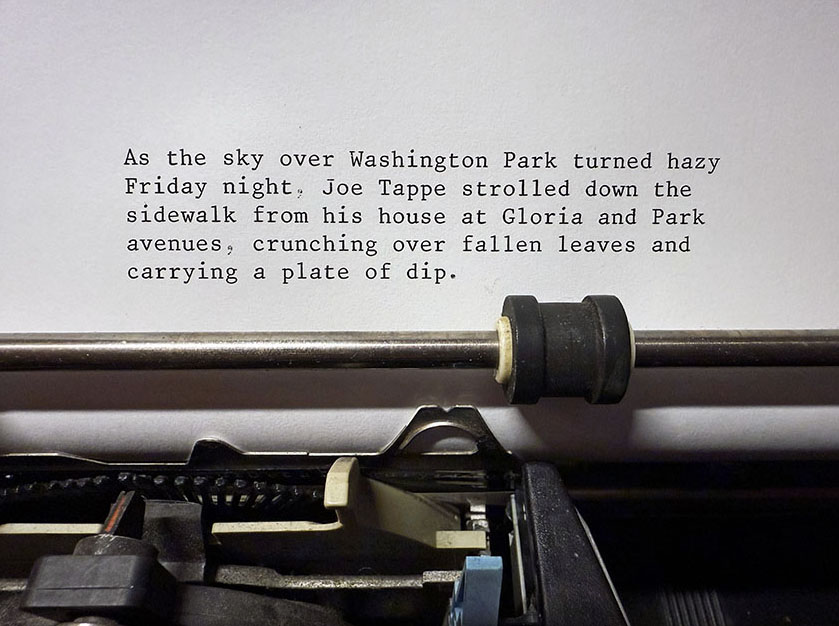
Above: An anecdotal lede, a method of infantilizing readers that was developed back in the 1980s.
It’s not just clickbait headlines that try to manipulate our attention. Web sites also measure how long readers stay on a page, as part of their “engagement” bean-counting. Thus writers and editors are under pressure from bean counters to withhold the key point (if any) of an article for as long as possible, to keep you on the page.
How often does this happen to you?: A clickbait headline promises something interesting. You click, and you keep reading. But you never seem to reach whatever interesting thing it was the clickbait headline promised.
Once upon a time, in a now-lost galaxy far away, there was the belief that writing served the reader. An important factor in serving the reader was not to waste the reader’s time. The inverted pyramid was the rule — the key facts, or one’s main point, came first. The details followed.
The concept of starting a piece with a trivial detail (the anecdotal lede) would have been incomprehensible, if anyone had thought of it. When someone did think of it, I think the idea came from the teaching of “creative writing,” and the notion that techniques used in fiction could somehow improve the writing in, say, newspapers. It was a horrible idea, and I’m convinced that it frustrated readers and drove them away, rather than delighting readers and sucking them in, as it claimed to do.
Consider the anecdotal lede in the photo above. What is the story about? Thirty-four words in, you have no idea — nor will you, until maybe the fourth or fifth paragraph. Did the writing delight you? I didn’t think so. Rather, the lede infantilizes you by supposing that you need to be babied with some “telling details” to “pull you into” the story. In my years as a newspaper copy editor, I called hogwash on this a thousand times. Nobody listened.
In that now-lost galaxy, the reader’s attention belonged to the reader. There was no attempt to hijack and control the reader’s attention. You didn’t baby the reader. But it was inevitable that, once it became possible to monitor, measure, and monetize everything that readers do, readers would be abused and exploited. The kind of writing that exploited readers in the online world quickly migrated to the world of print, where reader behavior cannot be monitored, but you get babied and manipulated just the same.
This battle is lost. There is no going back. But standards, once set, continue to exist, even if hardly anyone honors them anymore.
I would argue that, in the long term, these new methods of reader exploitation are self-defeating because they drive readers away. There are a great many publications that once were respected but that are now clickbait factories that are failing but that crank out clickbait in their desperation to survive — the New Republic, Slate, Popular Mechanics. On average, people spend far less time on Facebook than they used to. People caught on to how they were being manipulated by Facebook, and they didn’t like it.
Even if video “reels” are the new attention sinks, and even if artificial intelligence convinces a great many young people that they no longer need to learn to write because AI will do it for them, nevertheless somebody has to learn to write, even if reading and writing become something done only by a high-information elite. Artificial intelligence can recycle the writing of humans, but it will never produce anything original until it can explore, experience, and move around in the world using senses and powers of its own.
We’ve all seen the articles about how children don’t read for fun anymore, and how even elite college students balk if asked to read an entire book. I have no idea what, if anything, can be done about that.
But I do feel very strongly that, even if reading well and writing well are to become elite activities for only a few, these elite readers and writers must not allow bean counters and the sorry crews who work for them to wipe out the high standards that once applied.
One can at least speak for such standards and keep them alive among those who still care. Meanwhile, my guess is that standards of writing and editing will get even worse, not least because so few of today’s young people will ever learn how to write.

Totally agree with you about the anecdotal lede, and thanks for the cultural history about how it became so overused.
I learned that “blackhole” about a year ago – even when I thought it was legit article re medical or nutrition. Godawful. I stick to local real practitioners for my education. Thanks for the article.